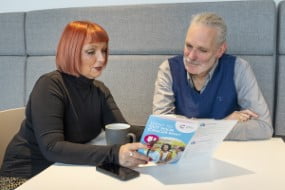Talking About Cancer: Reducing Risk, Early Detection and Myth-busting
Learn from experts at Cancer Research UK about how you could save lives by talking about cancer prevention and early detection.
Who is the course for?
This course is designed for anyone who would like to improve their ability – personally or professionally – to have conversations about cancer and health.
It will be particularly useful for those with an interest in sharing the causes of cancer, the importance of early diagnosis and advocating for cancer prevention and cancer screening.
The course will be helpful professionally for those working or volunteering in the following healthcare areas: health advocacy, health promotion, care and support work, community health centres and services, GP surgeries, mental health, nursing, occupational therapy, oncology, osteopathy, pharmacy, physiotherapy, dentistry, public health, radiotherapy, sexual health, social work.
What topics will you cover?
Key facts and health messages about cancer prevention, the national cancer screening programmes and the importance of early diagnosis.
How to talk about cancer and have conversations with others to help them take positive action.
Identification of people’s possible barriers to making positive changes for their health or seeing a doctor.
Communication methods that can help people overcome these barriers and avoid defensiveness and fear.
Identifying how our own feelings can affect how we approach conversations.
How to signpost people to the right places for cancer advice and support.
Creating an action plan so that you can feel confident when talking about cancer.
What will you achieve?
By the end of the course, you‘ll be able to…
Summarise simple, reliable facts about cancer, prevention, early diagnosis and cancer screening.
Engage those around you in effective conversations about cancer.
Identify appropriate sources of support and information about cancer, and signpost people to them.
Assess the barriers that can prevent people from taking positive action for their health or visiting the doctor, and engage them in a way that encourages them to take action.
Develop a plan of action to help you talk about cancer.
User Reviews
Be the first to review “Talking About Cancer: Reducing Risk, Early Detection and Myth-busting”
You must be logged in to post a review.







There are no reviews yet.